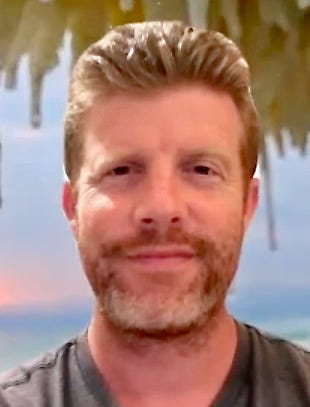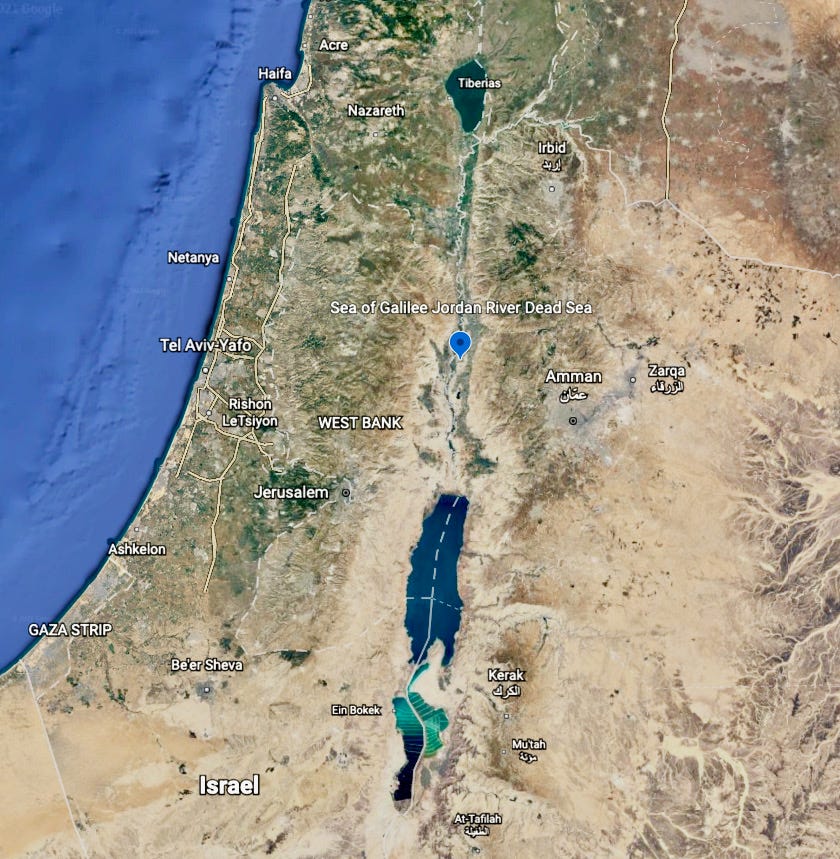EXCLUSIVE: The Dead Sea Story – A tragedy of biblical proportions
Unique global treasure may be gone in 30 years as water rapidly vanishes. Noam Bedein has a solution. Watch our interview below.
There is no other natural phenomenon on Earth like the Dead Sea. This body of briny water – more than 1,300 feet below sea level – has been a focal point in the Middle East since biblical times.
Today, it faces the real prospect that in a few decades it'll disappear entirely. The water is rapidly vanishing. The causes are many, but there is one NGO that’s working tirelessly to avoid such a tragic loss for humanity.
The Dead Sea Story, founded by Noam Bedein, an Israeli photojournalist, international speaker and environment visual arts activist, has since 2016, “focused on the magnificent, magical and endangered Dead Sea – the changes it is undergoing and the healing that is necessary.”
This is a magnificent, inspiring story. The whole world needs to know about it.
Noam Bedein joins us below in a 14 minute exclusive interview to talk about his life’s work.

For more than 30 years, the Israeli government has considered six different possible proposals to replenish the water in the Dead Sea.
“The most tangible solution … was a regional cooperation with Jordan and the World Bank,” Bedein says. “It was called the Dead Sea-Red Sea Canal. It has been on the table for the over 30 years and again in recent months.”
Of all the solutions, this was by far the most ambitious.
It would have involved building a pipeline from the Red Sea to the Dead Sea, and a massive desalinization plant that would have pumped fresh water to Jordan and the remaining briny waste into the Dead Sea.
“Jordan is considered one of the driest countries in the world today,” Bedein says, “and therefore [the canal would] provide an enormous amount of water for a population that is thirsty, [and] take [the remaining] water in order to preserve a water treasure.”
He’d added: “The World Bank promised $10 billion for this project because they saw it as a symbol of cooperation in the Middle East.”
Alas, nothing is quite so simple in the Middle East, especially between Israel and its immediate neighbors.
In a June 17 article in the Times of Israel, After years of delays, Jordan said to nix Red Sea-Dead Sea canal with Israel, PA The Times reported: “After years of no progress at all, Jordan has decided to cancel a joint project with Israel and the Palestinian Authority for a canal linking the Red Sea and the Dead Sea.
“Amman has decided to finally pull the plug on the joint pipeline, saying there was ‘no real Israeli desire’ for the plan to go ahead.”
The Times went on to say: “The Red Sea-Dead Sea canal project had long been delayed by bureaucratic hurdles, financing difficulties and environmentalist objections, compounded by Israel’s lack of a functioning government for two years.”
Echoing exactly what Bedein says in the interview below, the story notes: “The project was further harmed by diplomatic tensions between Israel and Jordan although newly installed Foreign Minister Yair Lapid appeared to court better ties on Monday, praising King Abdullah as ‘an important strategic ally’ and promising to work with him.”
Sigh! Whenever the politicians and bureaucrats get involved with a project as important and complex as this, you can bet they will tie it up in so much red tape that it will eventually be strangled.
“To be honest, right now there is no solution for the Dead Sea,” Noam Bedein says in the interview.
One of the reasons is, obviously, a long history of controversy. In August 2017, the Times of Israel published Experts say Red Sea-Dead Sea pipe dream isn’t worth its salt in which it reported:
“For the past 50 years, politicians from both Israel and Jordan have embraced plans for Dead Sea canals, utilizing them as a political tool to propose mega-infrastructure projects with questionable utility and little thought to environmental harm.
“After all, who wants to go on record in opposition to a ‘Peace Canal,’ which can bring badly needed water and hydroelectric power to Jordan, Israel, and the Palestinian territories, all while saving the irreplaceable Dead Sea?
“Instead, experts say the proposal is a trumped-up water swap that may wreak havoc on the environment and will do little to save the Dead Sea, and is only being pursued for its public relations value and political expediency.”
The price tag for this mega-project? A cool $10 billion. Possibly as much as $30 billion, according to the NGO EcoPeace.
At the end of its lengthy analysis, the Times of Israel quotes one of the world’s first advocates for a Jewish state.
“ ‘The hydraulic engineers had achieved remarkable things,’ Theodor Herzl wrote in 1902. Herzl may not have dreamed that the canal would still be a political game piece, more than 100 years later, but he got a few things right.
‘Every drop of water that fell from the heavens,’ he predicted, ‘was exploited for the public good.’ ”
Not withstanding the negative press, Noam Bedein has a plan!
“Israel has pulled out [of the canal plan] because it was not economically worth it for Israel,” he said. “Israel does not need another source of water. And, because of the tensions, always happening in both countries, that's why things were never actually a ‘go’.”
For the past five years, Bedein has been exploring the Dead Sea by boat and documenting its beauty on his Instagram page Dead Sea Boat Excursion where he explains: “I've been exploring and documenting the World Wonder – The Dead Sea – the lowest place on Earth, solely by boat since April 2016. Join me!”
It is because of his thorough research and well-documented knowledge of the area that Bedein has come up with an inspired idea to save the endangered global treasure.
“We've taken upon ourselves … to advocate for the true, natural solution of the story,” Bedein says.
That would be to restore “the historical flow [from] the Sea of Galilee [through] the Jordan River, having the water flowing naturally to the Dead Sea in the long run,” he says.
It’s a simple, sustainable and sensible proposal.
A glance at the region from Google Earth reveals that the Sea of Galilee in northern Israel is connected to the Dead Sea via the Jordan River. For eons water has flowed from north to south along this natural waterway.
In recent decades however, this natural flow has been interrupted by industrial development and human consumption of water for populations on both sides of the Jordan River.
It can be seen, therefore, that man-made interference has interrupted the natural replenishment of the Dead Sea, resulting in a rapid decline of its water level — about 5 meters per year, Bedein says.
At this rate, experts have predicted, by about 2050 there could be no water at all left in the Dead Sea.
Restoring this natural flow has become the top priority of the Dead Sea Revival Project.
“The Dead Sea Revival Project (DSRP) aims to become a leading NGO for environmental education and activism,” says its web site. “We want to stimulate the growth of global support for ‘saving our water treasures’ by exciting the imagination of individuals and groups.”
One of the main vehicles for accomplishing this goal is evident in the virtual reality tour on the website Noam Bedein's Dead Sea Story in 360 VR
“I explore the salty exotic shores that can be reached only by boats and record the ecological phenomena appearing out of the sea due to the rapid drop of water levels,” Bedein narrates as he sails the Dead Sea.
“These salt formations were completely underwater when I started documenting in April 2016. Here's an entire new level from September 2017 that appeared out of the water.”
The water had dropped so much that new salt formations had emerged as if they had ARISEN from the deep!
Bedein’s passion is evident, and his skills at photography make this VR tour a thing of beauty.
“This is what I call ‘illusory beauty.’ On the one hand, discovering authentic natural phenomena, but on the other hand this beauty is the result of an environmental catastrophe – due to the lowest [water] levels in recorded history.”
In the past two years, Bedein has become an eyewitness to the dramatic environmental changes of this world wonder.
“It is this fascinating environmental contrast in which I aim to inspire people in Israel and around the world both interactively and by joining us on eco-sightseeing visits.”
In the interview, Bedein says having Israel supply more water to the Sea of Galilee in northern Israel and filling it up, then opening up the dams and having water flow through the Jordan River is “the most natural kind of way of revitalizing the Dead Sea.
“That's the ultimate and most natural solution today.”
His organization’s goal is to spread the word about both the crisis and the solution. “Our job is to get the word out and to spread the story in any ways possible. And we have been doing it,” Bedein said.
He has been documenting the water level decline for the past five years, and has shared his findings with the world through the Dead Sea Revival Project. If there is any hope to prevent a tragedy of biblical proportions it is likely to come from the efforts of Noam Bedein.
Watch and listen to him talk about his passion in the interview below.
EDITOR’S NOTE: For our hearing impaired readers, please be advised to view this video on YouTube where you can activate closed captioning. Click link in lower left corner.






The Dead Sea and The Red Sea must be taken care of and be saved for the future of all mankind!
Such an interesting interview and article.
It seems to be a war of water.
Not dissimilar to that of the worlds second driest continent, Australia.
We have the Murray Darling Basin which spreads over four states.
Each State wants to get the most water possible This at times leads to South Australia water stress. Cubbie Station in Queensland has in the past taken water equivalent to the total entitlement of all of New South Wales.